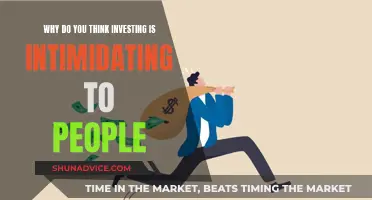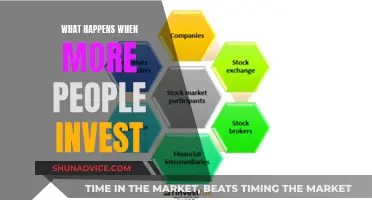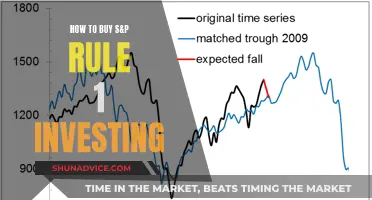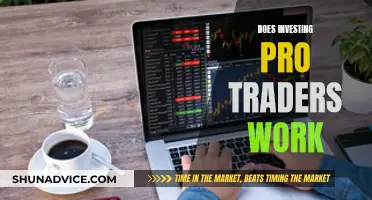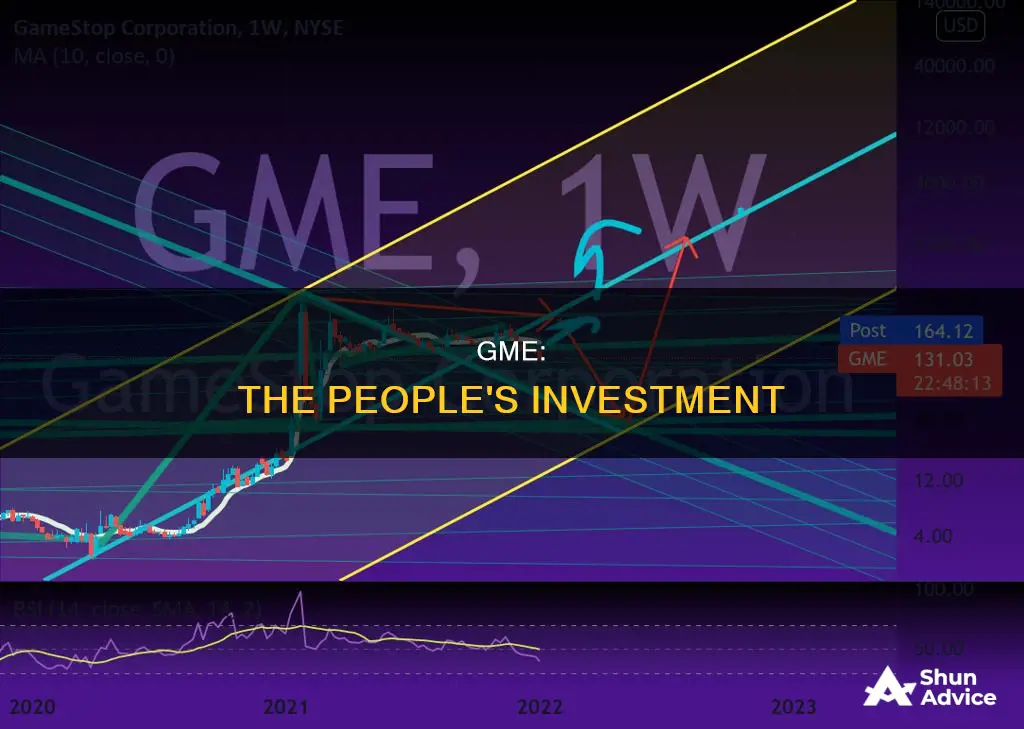
GameStop's stock surge can be attributed to a confluence of factors, including online enthusiasm, memes, and buzz, largely driven by the subreddit WallStreetBets. The stock's unexpected rise is not due to any specific actions by the company but rather the result of savvy short-term investing. A short squeeze was created as Redditors on r/WallStreetBets recognised the short opportunity early and moved to buy GameStop stock early and cheaply. This, in turn, drove up prices as short sellers rushed to buy back stock to minimise losses.
What You'll Learn
- A short squeeze caused by a large number of investors betting against GameStop
- A self-fulfilling prophecy fuelled by the fervour of day-traders
- The addition of Chewy co-founder Ryan Cohen to GameStop's board
- GameStop's attempt to remodel stores into experiential event spaces
- The stock's status as a meme

A short squeeze caused by a large number of investors betting against GameStop
GameStop's stock activity has been rather unusual. The company's shares have skyrocketed to record levels, and this surge in value is not due to any actions by the company itself but rather a savvy investment strategy. This has been driven by a group of hobby investors on the Reddit group r/WallStreetBets, who have been encouraging each other to buy GameStop stock, resulting in a short squeeze.
A short squeeze occurs when a stock is heavily shorted, and a rise in its price forces short sellers to get out of their bets. Short sellers borrow shares of a particular stock and sell them, hoping to repurchase them later at a lower price and pocket the difference as profit. However, if the stock price rises instead, short sellers are forced to buy back the stock at higher prices to minimise losses, creating a feedback loop that further drives up the stock price.
In the case of GameStop, small-time investors on Reddit banded together to raise the stock price to stunning levels. They encouraged each other to keep buying GameStop stock, pushing it even higher, in what is known as a short squeeze. This was done in part to inflict pain on short sellers, hedge funds, and other big financial firms, with some investors citing a desire to even the ledger with the financial elite, who benefited from years of gains while others fell behind.
The short squeeze caused by the large number of investors betting against GameStop has resulted in significant losses for short sellers. As the stock price rose, short sellers had to buy back the stock at higher prices, leading to massive losses. This has also caused fees to borrow GameStop shares to increase to unprecedented levels. The short squeeze has been so effective that even firms that often identify overvalued stocks good for short-selling, such as Citron Research, have given up on shorting GameStop.
Salary and Investment: A Correlation
You may want to see also

A self-fulfilling prophecy fuelled by the fervour of day-traders
The fervour surrounding GameStop (GME) stock is largely attributed to the online enthusiasm and coordinated efforts of day-traders congregating on Reddit's WallStreetBets forum. This group of predominantly hobbyist investors, often referred to as "day-traders", has been characterised as a "rogue troll army" disrupting the traditional practices of Wall Street. Their interest in GameStop's stock is not solely based on financial analysis but also driven by nostalgia, brand recognition, and a desire to support an underdog brand.
The narrative surrounding GameStop's stock is an intriguing tale of a struggling video game retailer, which has seen its stock surge to unprecedented heights, fuelled by the enthusiasm of these day-traders. GameStop, as a brick-and-mortar retailer, has been facing challenges due to competition from digital retailers like Amazon and the shift towards customers buying digital versions of games. However, the involvement of day-traders has created a short squeeze, where investors who had bet against the stock by short-selling are now forced to buy back shares at a higher price to minimise their losses. This, in turn, drives the stock price even higher, creating a self-fulfilling prophecy.
The day-traders' interest in GameStop can be attributed to a combination of factors, including the company's attempts to remodel stores, the addition of Chewy's co-founder Ryan Cohen to its board, and the appeal of investing in an underdog brand. The community aspect of WallStreetBets, with its unique language and memes, has also played a significant role in attracting investors. Many of these day-traders are not full-time investors but rather hobbyists who trade on the side, driven by FOMO (Fear of Missing Out) and the thrill of potentially making substantial gains.
The GameStop stock surge has also attracted attention from regulatory bodies and the media, with some expressing concern that the frenzied trading activity could be indicative of another market crash. While the future of GameStop's stock price remains uncertain, the phenomenon highlights the impact of online communities and day-traders on the stock market, challenging traditional investing norms and creating self-fulfilling prophecies.
Investing: Separating Fact from Fiction
You may want to see also

The addition of Chewy co-founder Ryan Cohen to GameStop's board
GameStop's addition of Ryan Cohen, the co-founder of Chewy, to its board of directors is a significant move that signals the company's intention to focus on digital transformation and e-commerce opportunities. Cohen, who is also the manager of RC Ventures and a substantial stockholder in GameStop, brings extensive experience in retail, technology, and e-commerce. He successfully led Chewy, an online pet supply store, as its CEO and oversaw its growth to market leadership in the pet industry before its sale to PetSmart Inc. in 2017 for $3.35 billion.
Ryan Cohen's appointment to the GameStop board, along with two other former Chewy executives, former CFO Jim Grube and former CMO Alan Attal, is a result of his push for the company to better focus on digital sales. Cohen's investment firm, RC Ventures, had built up a roughly 10% stake in GameStop, making it one of the largest investors in the company. In a November letter, Cohen expressed his desire for his firm to have a presence on the board, not as an "isolated stockholder advocate," but as a driving force for change.
GameStop recognised the value that Cohen and his team could bring to the table, particularly in the realm of e-commerce and technology expertise. The company was facing increasing competition from digital game stores and needed to adapt to the changing landscape. Cohen proposed a plan to the board to focus on e-commerce opportunities, including an online version of GameStop's well-known game trade-in program. This proposal was well-timed, as the coronavirus pandemic had provided an unexpected boost to the video game industry, with sales surging and people turning to video games during lockdowns.
The addition of Ryan Cohen and the former Chewy executives to the GameStop board brings a fresh perspective and expertise in digital transformation and e-commerce. This move is intended to help GameStop capture significant growth opportunities, adapt to the changing market, and remain competitive in the face of increasing digital competition. It remains to be seen how Cohen's influence will shape the future of GameStop, but his appointment has already sent a strong signal to the market about the company's commitment to embracing digital transformation.
Wealthy Secrets: Where the Rich Invest
You may want to see also

GameStop's attempt to remodel stores into experiential event spaces
To address this challenge, GameStop has partnered with design firm R/GA to create unique in-store experiences that will make shopping at GameStop more interactive. The company aims to introduce new ways for customers to try games before purchasing and add features that encourage people to visit their local branches more often.
One such initiative is the introduction of esports areas that offer competitive sessions in home-grown e-Leagues. GameStop has also expressed interest in locations that sell strictly retro gaming software and hardware. These new store concepts will be piloted in select markets, likely in the US, to test their viability.
The company's Eric Bright discussed the transition from a "transactional retailer into an experience-based retailer" in an interview, citing the partnership with esports group Complexity Gaming, which helped design an 11,000-square-foot 'Performance Centre' with a gaming arena, merchandise areas, and a video studio.
The remodelling of stores into experiential event spaces is just one aspect of GameStop's strategy to enhance the in-store experience and drive foot traffic. By creating interactive and social gaming communities, GameStop hopes to revitalise its brand and improve its financial performance.
Riches in Art: Where the Wealthy Invest
You may want to see also

The stock's status as a meme
GameStop (GME) is widely regarded as the first "meme stock". Its price rose as much as 100 times over several months as its online community crafted a short squeeze. The stock's value was driven more by social media enthusiasm than any underlying financial metrics.
The GameStop saga demonstrated that coordinated small-scale retail investors could significantly impact the stock market. The stock's popularity also stems from its underdog status, as a struggling brick-and-mortar retailer in an increasingly digital market.
The influence of the online community was evident in the stock's resurgence in May 2024, driven by the return of Keith Gill, aka "Roaring Kitty", to social media. Gill, who had been largely absent since the height of the meme stock frenzy in 2021, posted a series of cryptic images and movie-inspired video memes that reignited frenzied interest in meme stocks. This resulted in a massive surge in trading volume and price, with GameStop shares skyrocketing nearly 100% on 14 May 2024.
The renewed meme stock rally extended beyond GameStop, with other companies like AMC Entertainment also experiencing significant increases in their stock prices. This served as a reminder of the unpredictable nature of markets and the power of social media to drive investor behaviour.
Ownership, Influence, and Trust
You may want to see also
Frequently asked questions
People are investing in GME due to the activity on the WallStreetBets subreddit, where posters have been touting the company aggressively. This has fuelled a short squeeze in GameStop (GME) stock.
A short squeeze is when a stock suddenly spikes higher, and short sellers rush to buy back shares to avoid losing money. This creates a rush to buy GameStop stock, driving the price up further.
WallStreetBets is a subreddit described as "4chan with a Bloomberg Terminal". It is a wild west of stock investing "advice" and memes. The community has been described as a rogue troll army messing with the "official" practices of Wall Street.


